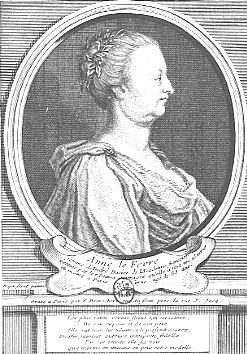| Anne Lefèvre  Born: 1654 Born: 1654
Birthplace: Preuilly-sur-Claise, France
Died: 17-Aug-1720
Location of death: Paris, France
Cause of death: unspecified
Gender: Female
Religion: Roman Catholic
Race or Ethnicity: White
Sexual orientation: Straight
Occupation: Scholar, Translator Nationality: France
Executive summary: Translator of Homer into French French scholar and translator from the classics, was born at Saumur, probably in March 1654. On her father's death in 1672 she removed to Paris, carrying with her part of an edition of Callimachus, which she afterwards published. This was so well received that she was engaged as one of the editors of the Deiphin series of classical authors, in which she edited Florus, Dictys Cretensis, Aurelius Victor and Eutropius. In 1681 appeared her prose version of Anacreon and Sappho, and in the next few years, she published prose versions of Terence and some of the plays of Plautus and Aristophanes. In 1684 she and her husband retired to Castres, with the object of devoting themselves to theological studies. In 1685 the result was announced in the conversion to Roman Catholicism of both Daciers, who were rewarded with a pension by the king. In 1699 appeared the prose translation of the Iliad (followed nine years later by a similar translation of the Odyssey), which gained for her the position she occupies in French literature. The appearance of this version, which made Homer known for the first time to many French men of letters, and among others to A. Houdart de la Motte, gave rise to a famous literary controversy. In 1714 la Motte published a poetical version of the Iliad, abridged and altered to suit his own taste, together with a Discours sur Homère, stating the reasons why Homer failed to satisfy his critical taste. Anne Dacier replied in the same year in her work, Des causes de la corruption du goút. La Motte carried on the discussion with light gaiety and badinage, and had the happiness of seeing his views supported by the abbé Jean Terrasson, who in 1715 produced two volumes entitled Dissertation critique sur l'Iliade, in which he maintained that science and philosophy, and especially the science and philosophy of René Descartes, had so developed the human mind that the poets of the 18th century were immeasurably superior to those of ancient Greece. In the same year Père C. Buffier published Homère en arbitrage, in which he concluded that both parties were really agreed on the essential point -- that Homer was one of the greatest geniuses the world had seen, and that, as a whole, no other poem could be preferred to his; and, soon after (on the 5th of April 1716), in the house of M. de Valincourt, Anne Dacier and La Motte met at supper, and drank together to the health of Homer. Nothing of importance, marks the remainder of Dacier's life. She died at the Louvre, on the 17th of August 1720.
Father: Tanneguy Lefèvre (d. 1672)
Husband: André Dacier (m. 1683, until her death)
Converted to Catholicism
Requires Flash 7+ and Javascript.
Do you know something we don't?
Submit a correction or make a comment about this profile
Copyright ©2019 Soylent Communications
|